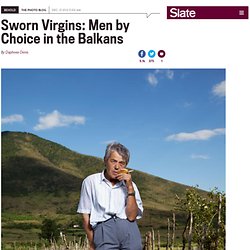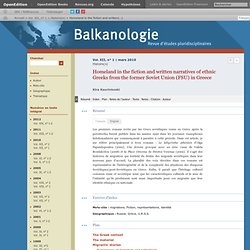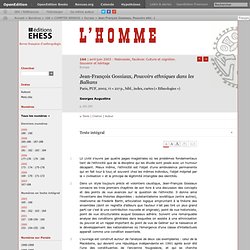

Anthropology, Sex, Gender: Gender is a Social Construction. What does it mean to say “gender is a social construction”?

Too much ink and internet time has already been spilled on such questions, but definitional issues and conceptual difficulties remain entrenched, even in academia where people should know better. A first issue is ongoing confusion around shorthand phrases like “gender is a social construction” or the phrase “race is a social construction.” Εργαστήριο Δημογραφικών και Κοινωνικών Αναλύσεων Πανεπιστημίου Θεσσαλίας - Εργο e-Demography - Εκδόσεις ΕΛΣΤΑΤ - Απογραφές - 1951. By the 1880's, steam power had shortened the journey to America dramatically.

Immigrants poured in from around the world: from the Middle East, the Mediterranean, Southern and Eastern Europe, and down from Canada. The door was wide open for Europeans. In the 1880s alone, 9% of the total population of Norway emigrated to America. After 1892, nearly all immigrants came in through the newly opened Ellis Island. One immigrant recalled arriving at Ellis Island: "The boat anchored at mid-bay and then they tendered us on the ship to Ellis Island…We got off the boat…you got your bag in your hand and went right into the building. Families often immigrated together during this era, although young men frequently came first to find work. The experience for Asian immigrants in this period was quite different. The 1907 "Gentlemen's Agreement" with Japan extended the government's hostility towards Asian workers and families. And for millions of immigrants, New York provided opportunity.
Κρυσταλλοπηγή. Damb-rimen. Dambeni. Identity. Border. Theory. Jill Peters: Documenting sworn virgins, women who live as men in Albania (PHOTOS). Jill Peters.

“Sworn virgins” (burrneshas in Albanian) are Albanian women who decide to ignore their female identity and live as men in the Balkans. Photographer Jill Peters traveled to Northern Albania to meet and photograph these women. The decision to live as men is more related to gender roles in the Albanian culture rather than a statement of sexuality; these women live their lives appearing as men. Sworn virgins have existed for centuries. According to tradition dating back to the 15th century developed out of the Kanun, a tribal code of law, tribal clans from the Balkans considered families without a male presence as pariahs. “Becoming a sworn virgin or burrnesha elevated a woman to the status of a man and granted her all the rights and privileges of the male population,” Peters writes on her website. ΝΤΡΟΠΗ ΣΟΥ ΑΘΕΕ ΚΑΜΙΝΗ! BERGHAHN BOOKS : Oxford, New York : Celebrating 16 Years of Independent Publishing! Επιγραφικές και άλλες μαρτυρίες για τα Κατσανοχώρια (1587-1699)
Μελέτη - Πρόταση έργου "Αρχαιολογικές επεμβάσεις και έρευνες στην περιοχή της αρχαίας Αθαμανίας και του βυζαντινού Τζεμέρνικου" Ιστορική και Λαογραφική Εταιρεία Τζουμέρκων Έδρα: Άγναντα Άρτας Διοικητικό Συμβούλιο Μαργώνης Κωνσταντίνος, ΠρόεδροςΜπαζούκας Αθανάσιος, Α΄ Αντιπρόεδρος (Τμήμα Ηπείρου)Καραγιάννης Ναπολέων, Β΄ Αντιπρόεδρος (Τμήμα Βορείου Ελλάδος)Τριάντου Όλγα, Γενική ΓραμματέαςΠατσούρας Αθανάσιος, ΤαμίαςΚαρατζένης Νικόλαος, ΈφοροςΣφώρος Νικόλαος, Οργανωτικός ΓραμματέαςΦλωράκης Βασίλειος, Υπεύθυνος Τύπου και Δημοσίων ΣχέσεωνΜακρής Αθανάσιος, Σύμβουλος Υπεύθυνοι Μελέτης: Αγγέλη Ανθή, Αρχαιολόγος της ΛΓ΄ Ε.Π.Κ.Α.Ζήδρου Κωνσταντίνα, Αρχαιολόγος, Υποψήφια Διδάκτωρ ΑρχαιολογίαςΠανεπιστημίου Ιωαννίνων Επιστημονικός Σύμβουλος:

Neil Smith Lecture.wmv.
Ελληνική Εταιρεία Πολιτικής Επιστήμης > ΣΥΝΕΔΡΙΑ & ΗΜΕΡΙΔΕΣ > Άλλων Φορέων. Πανεπιστήμιο Θεσσαλίας Γεφυρώνοντας τις γενιές: Διεπιστημονικότητα και αφηγήσεις ζωής στον 21ο αιώνα.

Χορός - Συνέδριο Φυσικής Αγωγής. Homeland in the fiction and written narratives of ethnic Greeks from the former Soviet Union (FSU) in Greece. Texte intégral I wish to express my gratitude to the French School of Athens whose grant enabled me to take part in the 9th conference of SIEF at the University of Ulster, Northern Ireland in June 2008.

My gratitude also goes to Katerina Seraïdari, Martin Baldwin-Edwards and to two anonymous readers from Balkanologie for their critical comments and suggestions on earlier drafts of this paper. Finally, special thanks to Martin Baldwin-Edwards who took the time to correct my English. 1The aim of this paper is to discuss fiction written by the ethnic Greeks who have arrived in Greece from the FSU since perestroika. In the first place, I will address the way that the concrete experiences of migration and settlement are discussed in the fictions concerned.
Jean-François Gossiaux, Pouvoirs ethniques dans les Balkans. 1Le livre s’ouvre par quatre pages magistrales où les problèmes fondamentaux tant de l’ethnicité que de la discipline qui les étudie sont posés avec un humour décapant.

Mieux même, l’ethnicité est l’objet d’une ambivalence permanente qui en fait tour à tour, et souvent chez les mêmes individus, l’objet méprisé par la « civilisation » et le principe de légitimité intangible des identités. 2Dans un style toujours précis et volontiers caustique, Jean-François Gossiaux consacre les trois premiers chapitres de son livre à une discussion des concepts et des points de vue avancés sur la question de l’ethnicité. 4La grande difficulté des reconstructions nationales tient, dit l’auteur, à ce que lorsqu’une nation est démantelée, on reconstruit toujours en plus petit, d’où le pullulement des ethnies dont les effectifs varient considérablement d’un recensement à l’autre. ΚΟΙΝΩΝΙΚΗ ΚΑΙ ΟΙΚΟΝΟΜΙΚΗ ΙΣΤΟΡΙΑ ΤΗΣ ΣΥΓΧΡΟΝΗΣ ΑΘΗΝΑΣ 1934 - 1950.
Metaxas. Agenda culturel.